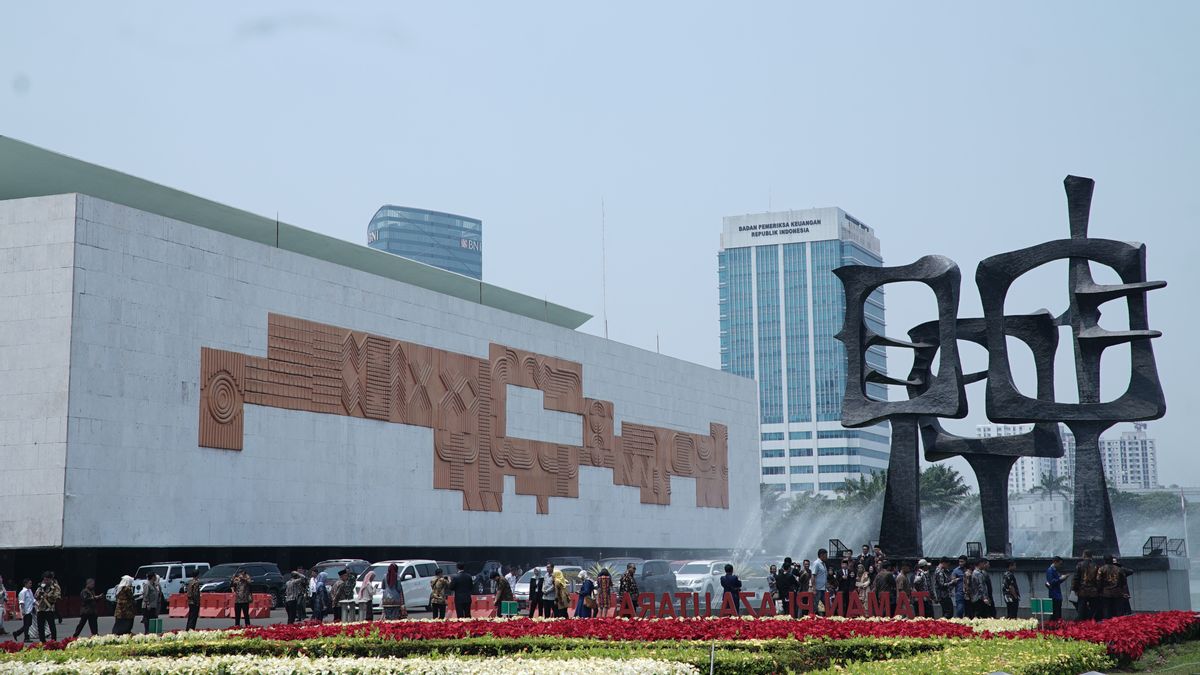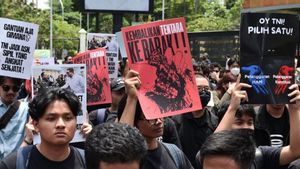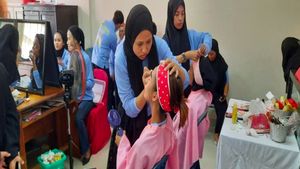JAKARTA - The case of PT Asuransi Jiwasraya's policy failure to pay has not only attracted the attention of the public and law enforcers because it caused significant losses. However, it is also a concern of the DPR. This is because members of the DPR do have the right to take part in finding out the causes of an issue that is of public concern from executive policy.
Currently, the DPR has formed a working committee (Panja) to investigate the case of default on the state-owned company policy. The formation of Panja was carried out in three commissions, namely Commission III in charge of law, Commission VI in charge of BUMN and Commission XI in charge of finance.
However, of the nine factions in the DPR, two of them, namely Democrats and PKS, still insist on forming a special committee. Let's understand what is the difference between Panja and Pansus. Then, which one is more effective?
Panja
In the eleventh section of the DPR RI Standing Orders (Tatib) of 2014, the working committee (Panja), article 98 reads: The apparatus of the DPR apart from the leadership of the DPR can form a working committee.
Then, in Article 100 paragraph 1 it is explained, "The working committee is tasked with carrying out certain tasks within a certain period as determined by the DPR apparatus that formed it."
Meanwhile, the scope of work of the committee is described in article 100 paragraph 2. "In carrying out the tasks referred to in paragraph (1), the working committee may hold hearings and public hearings meetings."
Article 100 paragraph 3 states: The working procedure for the working committee is determined by the DPR apparatus that forms it.
Article 100 paragraph 4 explains that the panja is accountable to the DPR apparatus that formed it. Then, article 100 paragraph 5 reads: The working committee is dissolved by the DPR apparatus that forms it after the term of its assignment has ended or because its task has been declared complete.
Meanwhile, whether the performance of the committee is sufficient or needs to be improved depends on the AKD that formed it, as Article 100 paragraph 6 states: Follow-up to the work results of the working committee is determined by the DPR apparatus that formed it.
The composition of membership is in accordance with Article 99 of the DPR Standing Orders, namely: Determined by the DPR apparatus which forms it as far as possible based on a balance of the number of Members of each faction.
This means that the panja is a team formed by the commission in the relevant DPR (AKD) to investigate a case that is in the public spotlight. And only responsible to the commission that created it.
Special Committee
The special committee (Pansus) is described in article 93 of the DPR Standing Orders, namely: The special committee is formed by the DPR and is a temporary apparatus for the DPR.
The procedure for the implementation of the special committee's duties is regulated in Article 96 paragraph 1, namely: The special committee has the duty to carry out certain tasks within a certain period determined by the plenary session of the DPR.
The scope of the special committee is also explained in the DPR Standing Orders in article 97. It is stated that the scope of the special committee is broader, namely that it can conduct work meetings, work committee meetings, formulation team meetings / small teams and or synchronization team meetings.
Not only that, if it is deemed necessary to make a case brightly lit, as long as it is agreed that the special committee can make another mechanism. This provision is regulated in Article 97 paragraph 2, which reads: In conducting the meeting as referred to in paragraph (1), other mechanisms can be implemented as long as it is agreed by the chairman and members of the meeting.
Meanwhile, the number of members of the special committee has been regulated in Article 94 paragraph 2 which reads: The number of members of the special committee is determined by the plenary session of the DPR at a maximum of 30 (thirty) people.
The term of work is regulated in Article 96 Paragraph 3. "The special committee shall be dissolved by the DPR after the term of its assignment has ended or because its duties have been declared complete,"
This means that the special committee can be dissolved by a collective decision of the DPR through a plenary session. If the committee is responsible to the AKD that formed it, the special committee is responsible to all members of the DPR.
Together with the Working Committee, the formation of the special committee will be followed by the implementation of the rights of DPR members, namely implementation, questionnaires and expressing opinions. This provision is also contained in Article 164 of the DPR Standing Orders Chapter IX concerning the procedures for exercising the rights of the DPR:
(1) DPR has the right:
a. interpellation;
b. questionnaire; and
c. express an opinion.
(2) The right of interpellation as referred to in paragraph (1) letter a is the right of the DPR to request information from the Government regarding government policies which are important and strategic and have a broad impact on the life of the community, nation and state.
(3) The right to inquiry as referred to in paragraph (1) letter b is the right of the DPR to carry out an investigation into the implementation of a law and / or Government policy which is important, strategic and has a wide impact on the life of the community, nation and state. which is allegedly contradicting the statutory regulations.
(4) The right to express an opinion as referred to in paragraph (1) letter c is the right of the DPR to express an opinion on:
a. Government policies or regarding extraordinary events occurring at home or in the international world;
b. (2) follow-up on the implementation of the interpellation right as referred to in paragraph (2) and the right to inquiry as referred to in paragraph (3); or
c. allegations that the President and / or the Vice President committed a violation of the law, whether in the form of treason against the state, corruption, bribery, other serious criminal acts, or disgraceful acts, and / or the President and / or Vice President no longer meet the requirements as President and / or Vice President. President.
As is well known, two factions that insisted on investigating the Jiwasraya case with the special committee, namely the Democrats and the PKS, finally proposed the formation of a special committee for questionnaires to the DPR leadership. This proposal was accepted by the Deputy Speaker of the DPR, Azis Syamsudin. A total of 104 members from the two factions have signed the proposal to form a special committee for the Jiwasraya questionnaire.
The procedure for using the right to inquiry is regulated in article 169 of the DPR Standing Orders:
(1) The right to inquiry as referred to in Article 164 paragraph (1) letter b shall be proposed by at least 25 (twenty five) Members and more than 1 (one) faction.
(2) Proposal for inquiry rights as referred to in paragraph (1) shall be accompanied by documents containing at least:
a. the material for the policy and / or implementation of the law to be investigated; and
b. the reason for the investigation.
(3) The proposal as referred to in paragraph (1) shall become the right of the DPR's inquiry if it is approved by the DPR plenary meeting which is attended by more than 1/2 (one half) of the number of Members and the decision is taken with the approval of more than 1/2 (one half). ) the number of Members present.
Unlike panja, the special committee has the power of law. Because the special committee can call the related parties forcibly. This is regulated in Article 175 of the DPR Standing Orders:
(1) The special committee requests the presence of state officials, government officials, legal entities, or members of the public requesting it in writing within a sufficient period of time stating the purpose of the request and the schedule for its implementation.
(2) The party as referred to in paragraph (1) must be present to provide information, including showing and / or submitting all necessary documents to the special committee.
(3) The special committee may postpone the meeting due to the absence of the parties as referred to in paragraph (1) for a valid reason.
(4) In the event that the party as referred to in paragraph (1) does not attend without a valid reason, or refuses to attend, the special committee may request one more attendance at the specified schedule.
(5) In the event that the party as referred to in paragraph (1) does not fulfill the second request for attendance without a valid reason or refuses to attend, the party concerned will be subject to a forced summons by the Indonesian National Police at the request of the special committee.
(6) In the event that the forced summons as referred to in paragraph (5) are not fulfilled without a valid reason, the person concerned may be held hostage for no longer than 15 (fifteen) Days by the authorized apparatus in accordance with the provisions of the statutory regulations.
Which is more precise?
Researcher of the Forum for the People Cares about Parliament (Formappi) Lucius Karus said that if the DPR is serious about the case that befell Jiwasraya and wants to investigate the matter to its conclusion, the choice is to form a special committee for the Jiwasraya questionnaire.
"The choice must be the special committee. Because with the special committee the work will be more effective. Panja three commissions can be combined into one special committee. They complement each other in trying to find out what the real problem is in Jiwasraya's body," said Lucius, when contacted by VOI, in Jakarta, Wednesday, February 5.
Lucius said, by forming a special committee the scope would be wider than the panja which only had one field. Moreover, recommendations from the special committee were submitted directly to the plenary meeting.

"The most important thing is that the DPRikers (conveyed) are the work of the DPR. So far the special committee has been working just like that. But the most important thing is how is the response of the DPR as an institution to show their concern for issues that are of public concern, "he said.
Instead of forming a working committee with three different fields, namely commission III (law), commission VI (BUMN) and commission IX (finance), the coordination would be better if the three working groups became one special committee for questionnaire. Lucius assessed that the special committee could accommodate the three fields and was much more effective.
"If commission III wants to know about the financial matters in Jiwasraya, he has to ask Commission XI. If he wants to know the legal basis, he asks Commission III. It's really funny how rich work is. So the special committee is more effective," he said.
The English, Chinese, Japanese, Arabic, and French versions are automatically generated by the AI. So there may still be inaccuracies in translating, please always see Indonesian as our main language. (system supported by DigitalSiber.id)









